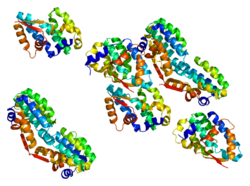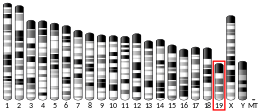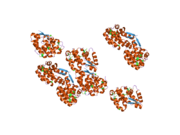TAF5
Transcription initiation factor TFIID subunit 5 is a protein that in humans is encoded by the TAF5 gene.[5][6][7]
Function
Initiation of transcription by RNA polymerase II requires the activities of more than 70 polypeptides. The protein that coordinates these activities is transcription factor IID (TFIID), which binds to the core promoter to position the polymerase properly, serves as the scaffold for assembly of the remainder of the transcription complex, and acts as a channel for regulatory signals. TFIID is composed of the TATA-binding protein (TBP) and a group of evolutionarily conserved proteins known as TBP-associated factors or TAFs. TAFs may participate in basal transcription, serve as coactivators, function in promoter recognition or modify general transcription factors (GTFs) to facilitate complex assembly and transcription initiation. This gene encodes an integral subunit of TFIID associated with all transcriptionally competent forms of that complex. This subunit interacts strongly with two TFIID subunits that show similarity to histones H3 and H4, and it may participate in forming a nucleosome-like core in the TFIID complex.[7]
Interactions
TAF5 has been shown to interact with:
References
- ^ a b c GRCh38: Ensembl release 89: ENSG00000148835 – Ensembl, May 2017
- ^ a b c GRCm38: Ensembl release 89: ENSMUSG00000025049 – Ensembl, May 2017
- ^ "Human PubMed Reference:". National Center for Biotechnology Information, U.S. National Library of Medicine.
- ^ "Mouse PubMed Reference:". National Center for Biotechnology Information, U.S. National Library of Medicine.
- ^ Dubrovskaya V, Mattei MG, Tora L (February 1997). "Localization of the gene (TAF2D) encoding the 100-kDa subunit (hTAFII100) of the human TFIID complex to chromosome 10 band q24-q25.2". Genomics. 36 (3): 556–7. doi:10.1006/geno.1996.0509. PMID 8884287.
- ^ Tanese N, Saluja D, Vassallo MF, Chen JL, Admon A (January 1997). "Molecular cloning and analysis of two subunits of the human TFIID complex: hTAFII130 and hTAFII100". Proc Natl Acad Sci U S A. 93 (24): 13611–6. doi:10.1073/pnas.93.24.13611. PMC 19367. PMID 8942982.
- ^ a b "Entrez Gene: TAF5 TAF5 RNA polymerase II, TATA box binding protein (TBP)-associated factor, 100kDa".
- ^ a b c Tao Y, Guermah M, Martinez E, Oelgeschläger T, Hasegawa S, Takada R, Yamamoto T, Horikoshi M, Roeder RG (March 1997). "Specific interactions and potential functions of human TAFII100". J. Biol. Chem. 272 (10): 6714–21. doi:10.1074/jbc.272.10.6714. PMID 9045704.
- ^ Hsieh YJ, Kundu TK, Wang Z, Kovelman R, Roeder RG (November 1999). "The TFIIIC90 subunit of TFIIIC interacts with multiple components of the RNA polymerase III machinery and contains a histone-specific acetyltransferase activity". Mol. Cell. Biol. 19 (11): 7697–704. doi:10.1128/mcb.19.11.7697. PMC 84812. PMID 10523658.
- ^ Martinez E, Palhan VB, Tjernberg A, Lymar ES, Gamper AM, Kundu TK, Chait BT, Roeder RG (October 2001). "Human STAGA complex is a chromatin-acetylating transcription coactivator that interacts with pre-mRNA splicing and DNA damage-binding factors in vivo". Mol. Cell. Biol. 21 (20): 6782–95. doi:10.1128/MCB.21.20.6782-6795.2001. PMC 99856. PMID 11564863.
- ^ Bertolotti A, Melot T, Acker J, Vigneron M, Delattre O, Tora L (March 1998). "EWS, but not EWS-FLI-1, is associated with both TFIID and RNA polymerase II: interactions between two members of the TET family, EWS and hTAFII68, and subunits of TFIID and RNA polymerase II complexes". Mol. Cell. Biol. 18 (3): 1489–97. doi:10.1128/mcb.18.3.1489. PMC 108863. PMID 9488465.
- ^ Bellorini M, Lee DK, Dantonel JC, Zemzoumi K, Roeder RG, Tora L, Mantovani R (June 1997). "CCAAT binding NF-Y-TBP interactions: NF-YB and NF-YC require short domains adjacent to their histone fold motifs for association with TBP basic residues". Nucleic Acids Res. 25 (11): 2174–81. doi:10.1093/nar/25.11.2174. PMC 146709. PMID 9153318.
- ^ Ruppert S, Wang EH, Tjian R (March 1993). "Cloning and expression of human TAFII250: a TBP-associated factor implicated in cell-cycle regulation". Nature. 362 (6416): 175–9. Bibcode:1993Natur.362..175R. doi:10.1038/362175a0. PMID 7680771. S2CID 4364676.
Further reading
- Zhou Q, Sharp PA (1995). "Novel mechanism and factor for regulation by HIV-1 Tat". EMBO J. 14 (2): 321–8. doi:10.1002/j.1460-2075.1995.tb07006.x. PMC 398086. PMID 7835343.
- Parada CA, Yoon JB, Roeder RG (1995). "A novel LBP-1-mediated restriction of HIV-1 transcription at the level of elongation in vitro". J. Biol. Chem. 270 (5): 2274–83. doi:10.1074/jbc.270.5.2274. PMID 7836461.
- Ou SH, Garcia-Martínez LF, Paulssen EJ, Gaynor RB (1994). "Role of flanking E box motifs in human immunodeficiency virus type 1 TATA element function". J. Virol. 68 (11): 7188–99. doi:10.1128/JVI.68.11.7188-7199.1994. PMC 237158. PMID 7933101.
- Kashanchi F, Piras G, Radonovich MF, Duvall JF, Fattaey A, Chiang CM, Roeder RG, Brady JN (1994). "Direct interaction of human TFIID with the HIV-1 transactivator tat". Nature. 367 (6460): 295–9. Bibcode:1994Natur.367..295K. doi:10.1038/367295a0. PMID 8121496. S2CID 4362048.
- Maruyama K, Sugano S (1994). "Oligo-capping: a simple method to replace the cap structure of eukaryotic mRNAs with oligoribonucleotides". Gene. 138 (1–2): 171–4. doi:10.1016/0378-1119(94)90802-8. PMID 8125298.
- Wang Z, Morris GF, Rice AP, Xiong W, Morris CB (1996). "Wild-type and transactivation-defective mutants of human immunodeficiency virus type 1 Tat protein bind human TATA-binding protein in vitro". J. Acquir. Immune Defic. Syndr. Hum. Retrovirol. 12 (2): 128–38. doi:10.1097/00042560-199606010-00005. PMID 8680883.
- Dubrovskaya V, Lavigne AC, Davidson I, Acker J, Staub A, Tora L (1996). "Distinct domains of hTAFII100 are required for functional interaction with transcription factor TFIIF beta (RAP30) and incorporation into the TFIID complex". EMBO J. 15 (14): 3702–12. doi:10.1002/j.1460-2075.1996.tb00740.x. PMC 452026. PMID 8758937.
- Pendergrast PS, Morrison D, Tansey WP, Hernandez N (1996). "Mutations in the carboxy-terminal domain of TBP affect the synthesis of human immunodeficiency virus type 1 full-length and short transcripts similarly". J. Virol. 70 (8): 5025–34. doi:10.1128/JVI.70.8.5025-5034.1996. PMC 190456. PMID 8764009.
- Kashanchi F, Khleif SN, Duvall JF, Sadaie MR, Radonovich MF, Cho M, Martin MA, Chen SY, Weinmann R, Brady JN (1996). "Interaction of human immunodeficiency virus type 1 Tat with a unique site of TFIID inhibits negative cofactor Dr1 and stabilizes the TFIID-TFIIA complex". J. Virol. 70 (8): 5503–10. doi:10.1128/JVI.70.8.5503-5510.1996. PMC 190508. PMID 8764062.
- Zhou Q, Sharp PA (1996). "Tat-SF1: cofactor for stimulation of transcriptional elongation by HIV-1 Tat". Science. 274 (5287): 605–10. Bibcode:1996Sci...274..605Z. doi:10.1126/science.274.5287.605. PMID 8849451. S2CID 13266489.
- Tao Y, Guermah M, Martinez E, Oelgeschläger T, Hasegawa S, Takada R, Yamamoto T, Horikoshi M, Roeder RG (1997). "Specific interactions and potential functions of human TAFII100". J. Biol. Chem. 272 (10): 6714–21. doi:10.1074/jbc.272.10.6714. PMID 9045704.
- García-Martínez LF, Ivanov D, Gaynor RB (1997). "Association of Tat with purified HIV-1 and HIV-2 transcription preinitiation complexes". J. Biol. Chem. 272 (11): 6951–8. doi:10.1074/jbc.272.11.6951. PMID 9054383.
- Dantonel JC, Murthy KG, Manley JL, Tora L (1997). "Transcription factor TFIID recruits factor CPSF for formation of 3' end of mRNA". Nature. 389 (6649): 399–402. Bibcode:1997Natur.389..399D. doi:10.1038/38763. PMID 9311784. S2CID 4413324.
- Suzuki Y, Yoshitomo-Nakagawa K, Maruyama K, Suyama A, Sugano S (1997). "Construction and characterization of a full length-enriched and a 5'-end-enriched cDNA library". Gene. 200 (1–2): 149–56. doi:10.1016/S0378-1119(97)00411-3. PMID 9373149.
- Bertolotti A, Melot T, Acker J, Vigneron M, Delattre O, Tora L (1998). "EWS, but not EWS-FLI-1, is associated with both TFIID and RNA polymerase II: interactions between two members of the TET family, EWS and hTAFII68, and subunits of TFIID and RNA polymerase II complexes". Mol. Cell. Biol. 18 (3): 1489–97. doi:10.1128/mcb.18.3.1489. PMC 108863. PMID 9488465.
- Brand M, Yamamoto K, Staub A, Tora L (1999). "Identification of TATA-binding protein-free TAFII-containing complex subunits suggests a role in nucleosome acetylation and signal transduction". J. Biol. Chem. 274 (26): 18285–9. doi:10.1074/jbc.274.26.18285. PMID 10373431.
- Brand M, Moggs JG, Oulad-Abdelghani M, Lejeune F, Dilworth FJ, Stevenin J, Almouzni G, Tora L (2001). "UV-damaged DNA-binding protein in the TFTC complex links DNA damage recognition to nucleosome acetylation". EMBO J. 20 (12): 3187–96. doi:10.1093/emboj/20.12.3187. PMC 150203. PMID 11406595.
- Martinez E, Palhan VB, Tjernberg A, Lymar ES, Gamper AM, Kundu TK, Chait BT, Roeder RG (2001). "Human STAGA complex is a chromatin-acetylating transcription coactivator that interacts with pre-mRNA splicing and DNA damage-binding factors in vivo". Mol. Cell. Biol. 21 (20): 6782–95. doi:10.1128/MCB.21.20.6782-6795.2001. PMC 99856. PMID 11564863.







